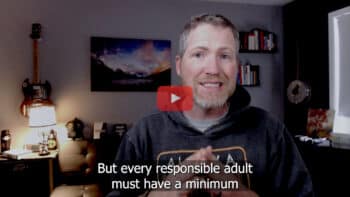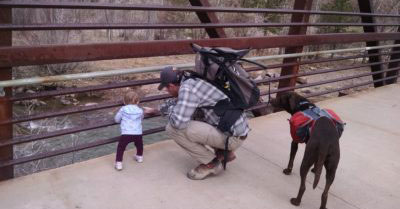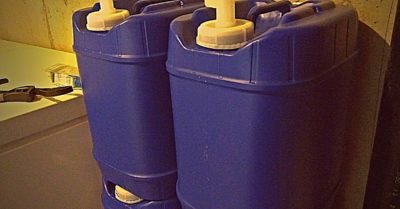Everyone talks about the best barter items during a financial collapse. And I’ve got no issues with that.
But it’s an old topic that’s been covered thousands of times. So I don’t feel like I can add any new insights to that conversation.
It’s essential, it’s been covered, and you know what to do. Buy lots of:
- Food
- Ammo
- Liquor
- Smokes
- Hand tools
- Medical supplies
- Etc.
However, very few articles discuss the best trade skills for bartering!
You see, eventually, you run out of stuff to trade if all you’ve done is stockpile supplies. You can have a bunch of ammo or medical supplies and trade those away for things like food and water. But at some point, those stocks dwindle in size, and then what?
Or worst yet, someone discovers you have a stash of valuables and decides to relieve you of them. And let’s say they get away with it.
Now you’re out of “stuff,” and unless you’ve some marketable skills for a survival world, you’re screwed.
So now the question becomes:
“What are the most desirable, marketable, and necessary skills in a survival world?”
That’s what we’re going to cover in detail next…
The Best Bartering Skills
The first few barter skills I want to cover all entail working with your hands and using hand tools. Why? Because we must assume electricity will no longer exist in mass distribution.
So band saws, circular saws, nail guns, and welding all need copious amounts of power to use. These devices are not survival-proof.
They’ll have little to no value in a post-apocalyptic world.
Instead, hand saws, hammers, and anvils will make an epic comeback. These hand tools will be in very high demand. So right there, you have a significant opportunity.
Don’t be the guy who digs for gold, be the guy who sells the gold diggers, shovels, and pans.
1 – Blacksmith
Learn how to make old-school hand tools from scratch. If you can turn primary resources into hand tools, you’re going to do just fine.
The primary way to do this without electricity is by being a blacksmith.
Back before electricity, every village, town, and city had at least one blacksmith. Some had several. They were in high demand and essential to creating tools and fixing items.
There were no assembly lines or massive factories. There were no replacement parts. Instead, you visited your local blacksmith, explained to them what you needed, and they made it for you.
Blacksmithing is dirty, challenging, and technical work. But it was an essential skill for ancient societies.
2 – Carpentry
A similar skill you may want to master is woodworking. Carpentry is an old skill that will come back in higher demand in a limited electricity world.
Carpentry is even biblical. Jesus is said to have been a carpenter’s son.
So crafting tools and items from trees is an ancient profession and an excellent skill for bartering.
3 – Growing Food
Growing food is still to this day essential for all human survival. Today we do it on a larger scale using the leverage and power of modern machines.
Well, what if those machines no longer have fuel to operate? They quickly become useless rusting heaps of metal.
But a farmer or backyard gardener who knows how to tend crops, to grow food will make a significant comeback.
Crop rotation, fertilizers, cultivating practices, and irrigation can all maximize production and yields. That’s why it’s an excellent skill to master.
And two complementary skills that go hand in hand in with growing food are seed saving and canning.
Often, you can save the seeds from produce and turn those seeds into future food. That is when you know you’re in a fantastic cycle of self-sufficiency.
Adding seed saving to your skillset is a no-brainer bartering opportunity.
The other skills you should add to your agriculture acumen are canning and preserving. If you get good at growing, you’ll grow way more food than you can consume. So you can either sell it right away or preserve it. But it would be a travesty to let any of it go to waste.
Plus, you’ll need food for the off-season winter months.
4 – Security
Another skill set for any survival coalition in a lawless world is security. Having intimate knowledge and training in firearms and security operations will be desirable.
Regardless of the disaster, there’ll be dangerous people around in the aftermath—amoral folks looking for easy targets. So a coalition will need those who know how to use firearms effectively. And they won’t hesitate to use them in a threatening situation.
And even better are advanced security measures skills. Security strategies such as:
- positioning
- scouting
- setting up lookouts
- communication
- sleep rotation scheduling
- booby-trapping
- funneling
- establishing quarantines
These skills and knowledge will allow you to lead a team to enhance group security.
That coalition (if they’re smart) will keep their security members well-fed and happy. That’s a perfect example of how this skills bartering system works!
5 – Scavenging
Another related skill set to security and self-defense is scavenging. If you’ve created a safe zone, eventually, people will need to leave this protection. Resources will run out, so they’ll need to look for fresh supplies, food, and resources.
Scavenging is mostly about self-defense if you run into trouble. But having a vast knowledge of what is and what isn’t worth taking…also matters.
The ability to turn what looks like trash to regular folks into treasure is a valuable skill set. It’s also not one everyone haves. So if you can turn everyday items into useful tools, you’ll find a nice niche you can use for bartering.
6 – Medical and First Aid
So what happens if someone gets injured or sick when 24-hour hospitals are no longer an option? You get attended to by the most medically skilled team member in your group.
The good news is, if you’re THAT person, you’re worth keeping around and protecting.
The more advanced your medical knowledge is, the more in demand you’ll be. No one wants to die from a lack of care, so if you keep people alive, you will do well just fine in this new world order.
7 – Hunting, Trapping, Breeding
Next, I’ll lump all protein acquisition strategies into one broad category. Hunting, trapping, snaring, raising, and breeding are all ways to provide protein.
These skills will keep you and your family fed in a long-term crisis. And in a survival group, you just became someone worth keeping around.
If you’re bringing in a constant source of calories, others will take care of your other survival needs. Free of charge!
That’s the essence of bartering.
8 – Communications
HAM radio equipment and operators will be highly desirable. Everyone wants to know what’s going on during a crisis.
If news, information, and intelligence sources go silent and you have a way to share information, you are valuable.
Operating HAM radio is not something you can learn in an hour. It takes knowledge and practice (over an extended period) to become proficient at it.
Plus, if you’re interested in becoming proficient in using HAM radio technology, I recommend you also learn how to repair HAM radio gear. Because this bartering skill only works when you’re equipment does.
If the equipment dies and you can’t fix it, you’ll drop several pegs in the “need to keep this guy around” category.
9 – Electrician
An Electrician is an often-overlooked trade skill that will be in high demand. But wait…what good is having electrical skills without grid power? Solar.
Of course, this depends on the region you live in and whether solar panels are prevalent or not. But I happen to live in Colorado, where the sun shines throughout the year. Solar panel installs are on the rise in this state.
Having the skills to daisy chain solar panels, hook up generators, and run electrical lines will come in handy.
10 – Home Economics
Another group of bartering skills everyone will need is home econ skills, such as:
- Sewing
- Mending
- Cooking
- Soap making
- Candle Making
- Shoe Repair
- Etc.
These will all become very necessary after just a few months in a TEOTWAWKI survival scenario.
These items are mere luxuries in a time of constant threat. But, eventually, things will settle back down, and these items will be highly desirable.
If you can make them, you’ll have no problems trading those skills (or items) for other things of value.
11 – Gunsmith / Reloading
I’ll wrap up the last one with one of my favorite bartering skills: gunsmith and reloading ammo.
Again it comes back to figuring out what’s essential for survival (i.e., survival firearms and bullets)—and then understanding that buying new guns or bullets in bulk quantities will be a thing of the past.
Fixing, repairing, and making from scratch desirable items will trade well in a barter economy.
One Final Note of Caution
I’ve read and heard many people saying they believe teaching will become a tradable skill. But I’m not convinced…
Once people realize their niche skillset keeps them alive, they won’t be “teaching” others.
If I’m the only person around who’s a blacksmith and everyone in my coalition comes to me for help making and fixing objects – there’s no way I’m going to start a trade school to teach others my craft.
At least not until resources are no longer scarce and life has returned to some normalcy.
The last thing I want in a survival situation is competition. You don’t want more than a few blacksmiths, gunsmiths, or medical personnel for a small group.
You need everyone to focus on what they are best suited for. Just don’t be a person who doesn’t have any of these skills.
So if your primary contribution to a survival group is accounting, video games, or fantasy football… Well, you can start “accounting” down your days.
Waste tends to be eliminated. Contribute or get left behind.
“Just In Case” Jack
P.s. One of the best ways I know to get prepared is by joining The Resilient Life.
It’s an online coalition of like-minded folks who are working to increase their self-reliance.
As members, you’ll have access to tons of survival challenges and preparedness badge requirements to help motivate and increase your self-reliance. It also tracks your resiliency progress through something called the “Readiness Score.”
Click here right now to learn more.

"Just in Case" Jack
Co-Founder of TheResilientLife.com and SkilledSurvival.com. Creates content, helps members, and is the visionary behind The Resilient Life’s way of living. Husband, father, mechanical engineer, survivalist, and prepper.
See how to find purpose & fulfilment through living a resilient life.




